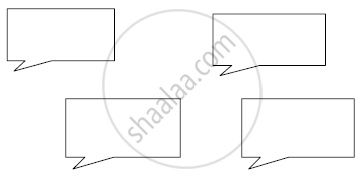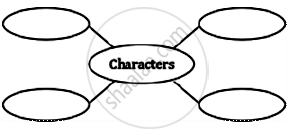Advertisements
Advertisements
Question
A1. Saving Motherland
I can save my motherland by putting an end to ……..

Republic Day! We grow aware
That nothing can be wrought by prayer
-Prop of the credulous-until
It is supported everywhere
By an all-powerful people's will !
We have been witness in the past to sights impossible to bear:
Famine and drought and dread and doom
Continue still to spread the gloom
Of humans turned to skeletons, to shrivelled bags of naked bones
Who have not even strength to vent their suffering through sobs and groans……
MAY EVERY Indian's heart become
An unafraid announcing drum
Echoing and re-echoing a new hope and a new desire
To burn up rubbish-heaps of hate,
Once and for all. Time cannot wait!
Burn up all selfish aims and ends in a great nation's cleansing fire!
Let India's millions chant in chorus:
A mighty future stands before us-
Down with all ruthless tyranny, down with all exploitation which
Renders the poor the poorer-and renders the bloated rich, more rich !
A 2. How does the poet express the condition of people during famines and droughts? (2)
Match:
Match the line with the figure of speech:
| 'A' | ‘B’ |
| (i) Drought and dread and doom | (a) Personification |
| (ii) Time cannot wait | (b) Alliteration |
| (c) Metaphor |
Solution
A1.
I can save my motherland by putting an end to hatred, selfish aims and ends, exploitation, and
tyranny.
A2.
The poet says that people who live in regions hit by famines and droughts turn into skeletons and shrivelled bags of naked bones. They do not even have the strength to vent their suffering through sobs and groans.
A3.
(i) Drought and dread and doom: Alliteration
(ii) Time cannot wait: Personification
APPEARS IN
RELATED QUESTIONS
Read the extract given below and answer the questions that follow :
'Never shall a young man,
Thrown into despair
By those great honey-coloured
Ramparts at your ear."
(a) Who is the speaker of these lines? Who is he speaking to ?
(b) What does the young man mean by 'honey-coloured ramparts' ?
(c) What does the word 'despair' mean ?
Read the following extract and answer the questions given below :
We used to watch the valley play hide and seek .
Shadowed by the mountain's immeasurable peak
Considered the largest thing known to man
Now skyscrapers are the most extravagant and titanic part of the plan
We used to sit next to the stream, the wind caressing our crown
Watching the magnificent untamed beasts roam far, far from town
Now they are just characters of folk tales, memories we pass down
An adjective to describe someone, no more a noun
This could be our reality.
(1) What was the largest thing known to man? (1)
(2) What would be the possible result of ignoring nature? (1)
(3) Give an example of personification from the extract. (1)
( 4) Pick out from the extract some expressions of geographical images. (1)
Read the following extract and answer the questions given below :
We, heroes and poor devils;
the feeble, the braggarts; the unfinished,
and capable of everything impossible
as long as it's not seen or heard
Don Juans, women and men, who come and go
with the fleeting passage of a runner
or of a shy hotel for travellers.
And we with our small vanities,
our controlled hunger for climbing
and getting as far as everybody else has gotten
because it seems that is the way of the world.
(1) Who are heroes and what are they capable of? (1)
(2) According to you, what difficulties do the middle-class people face? (1)
(3) Name and explain the figure of speech in the following line :
... Women and men, who come and go. (1)
(4) Pick out the line from the extract, which shows the overambitious nature of the middle-class people. (1)
Read the following extract and answer the questions given below:
Old women once
were continents.
They had deep woods in them,
lakes, mountains, volcanoes even,
even raging gulfs.
When the earth was in heat
they melted, shrank,
leaving only their maps.
You can fold them
and keep them handy:
who knows, they might help you find
your way home.
Question
(1) What does the geographical imagery used in this extract suggest?
(2) Who do you think should take care of your grandparents? Why?
(3) Name and explain the figure of speech in the following lines: Old women once were continents.
(4) Find out the expressions that show how old women are still capable of caring for others, despite their old age?
Read the following extract and then do all the activities that follow :
How do you know
Peace is a woman?
I know for
I met her yesterday
on my winding way
to the world’s fare,
She has such a wonderful face
just like a golden flower faded
before the prime.
I asked her why
She was so sad?
She told me her baby
was killed in Auschwitz,
her daughter in Hiroshima
and her sone in Vietnam,
Ireland, Israel, Palestine, Lebanon,
Bosnia, Rwanda, Kosovo and Chechnya ......
A1. Web -
Completely the following web by listing character mentioned in the extract :

A2. Poetic device -
Figure of speech :
‘Peace is a woman ?’
Name and explain the figure of speed in the above line.
A3. Personal response :
Suggest two solutions to avoid wars.
A4. Creativity :
Compose two poetic lines titled “Say ‘no’ to wars”.
Read the following poem and write an appreciation of it with the help of the given points in a paragraph format:
|
The Pulley When God at first made Man, So strength first made a way; For if I should (said He) Yet let him keep the rest, |
- The title of the poem (1)
- The poet (1)
- Central idea/theme (2)
- Rhyme scheme (1)
- Figure of speech (1)
- Special features (2)
- Favourite line/lines (1)
- Why I like/don’t like the poem (1)
Read the following extract and answer the questions given below:
I asked her why
She was so sad?
She told me her baby
was killed in Auschwitz.
her daughter in Hiroshima
and her sons in Vietnam,
Ireland, Israel, Palestine, Lebanon,
Bosnia. Rwanda, Kosovo, and Chechnya.
(1) Why was the woman in the extract sad?
(2) What do you think. are the dire consequences ofa war?
(3) Name and explain the figure of speech in the following lines :
'I asked her why
she was so sad ?'
(4) What purpose docs the dialogue form serve in the extract?
Read the extract given below and answer the questions that follow:
I stand and look at them long and long.
They do not sweat and whine about their condition.
(a) The poet who has written these lines is ____________
i. Robert Frost
ii. Carolyn Wells
iii. Walt Whitman
iv. Ogden Nash
(b) Who are ‘they’ referred to here?
i. Animals
ii. Tigers
iii. Ananda’s friend's
iv. Wanda’s dresses
(c) The poet looks at them long and long because he __________
(d) Which word in the extract means ‘complain’?
Read the extracts given below and answer the questions that follow:
(There is a languid, emerald sea,
where the sole inhabitant is me-
a mermaid drifting blissfully.)
Questions :
(a) Who does 'me' stand for?
(b) How does 'me' feel?
(c) Who is 'me' compared to?
(d) Which word in the extract means the opposite of 'sorrowfully'?
